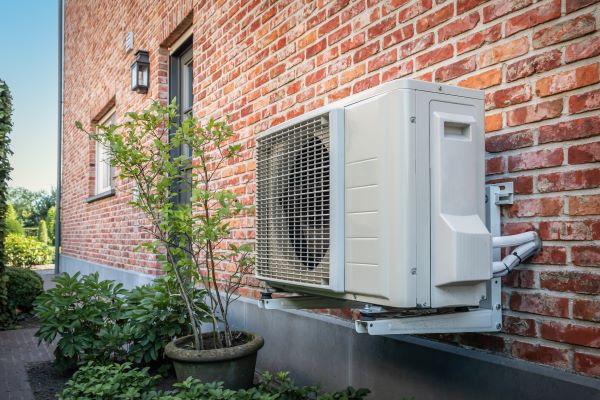At All Weather Heating & Cooling, we specialize in every method of temperature control. You name it, we’ve installed it, repaired it, and removed it. One of the most common questions we get is whether a heat pump can replace a traditional air conditioning system. The answer differs depending on your home and your cooling needs. The following blog post will help you decide for yourself if you need AC with your heat pump.
An Introduction to Heat Pumps
Air conditioning technology has advanced dramatically in the last few decades. Even just the last few years have seen major improvements in energy efficiency and cooling ability.
One of the most important and impressive new technologies to arrive on the scene is the heat pump. Vastly smaller and more cost-effective than other HVAC systems, the heat pump is more environmentally friendly and cheaper to operate than older cooling methods.
How a Heat Pump Works
Anyone who has had to pay an energy bill after a hot summer knows that traditional air conditioning is extremely energy-intensive. That’s because it uses electricity to not only pull heat energy from the air but to circulate the cooled air throughout the ductwork in a building using large fans.
Essentially, heat pumps create cooled air in the same way. Using an evaporator coil, they remove heat from the air and vent or “pump” it outside the building. Where they differ is in the method they use to transport the now-cooled air. Instead of using those large (and costly) fans, they vent it directly into the room.
Benefits of Cooling With Heat Pumps
Heat pumps have several major advantages over other methods of air conditioning. As we mentioned in the section above, they don’t require fans or ducts to circulate air throughout a room. This cuts down significantly on energy usage and makes heat pumps much more versatile. They can be installed in older buildings and areas of the home that don’t have access to a system of ductwork.
Also, they’re smaller than central air conditioning units and targeted to specific areas, rather than a single unit used for the entire home. This helps to further cut back on heating and cooling costs, as it isn’t necessary to expend energy on an area that is not currently occupied.
Another potential benefit of installing a heat pump is the possibility of earning tax credits as a government-sponsored reward for investing in green energy. Do some research or ask your HVAC company if there are any of these credits available in your area.
Heat Pumps Are Not Just for Cooling
Speaking of versatility, one of the big benefits a heat pump has over other HVAC systems is its ability to function as both a heater and an air conditioning unit. When the heat pump is in heating mode, heat is drawn from the outdoor environment and vented inside to warm the home. Unlike most heating methods, this doesn’t require burning any fuel source and doesn’t create harmful byproducts, such as carbon monoxide. When it’s in cooling mode, the heating function is reversed. The heat pump draws heat from inside the building and vents it outside, cooling the home.
Are There Any Drawbacks?
Heat pumps are an excellent way to provide cooling (and heating) for an area without spending a lot on electricity. However, there are some situations where an AC heat pump is not necessarily the ideal cooling method.
We’ve already mentioned that heat pumps are smaller than traditional central air conditioning units. This means they cost less to operate, but it also means they may struggle to cool larger buildings. You can bypass this issue by installing multiple heat pump units in the different zones of the home, but note that this isn’t necessarily cost-effective. Heat pumps can be expensive to install, and paying for several of them can quickly offset the energy savings they will create for you.
So, Can I Replace My AC With a Heat Pump?
Heat pumps do an excellent job under most circumstances, but they can sometimes have difficulty contending with temperature extremes. Since they only vent cooled air—rather than circulating it themselves—they are not necessarily up to the task of providing cooling for a home in an area that experiences extremely hot summers or providing heating in an area with extremely cold winters. Homeowners living in these areas may need to supplement their heat pumps with a more traditional backup unit.
If you want to replace your current HVAC system entirely, it’s best if you live in a relatively temperate area. All Weather Heating & Cooling is located in Ohio, near Lake Erie, where summers are often relatively moderate. As a result, we find that a good heat pump is the only cooling system many homeowners need to stay comfortable during the hot summer months.
What About Service Costs?
Heat pumps are becoming more common in homes all over the country, meaning that it’s quickly becoming easier to find trained technicians who know how to install and service them. Average repair costs for heat pumps will generally run a few hundred dollars, depending on the problem. You can often avoid spending a great deal on repairs by investing in regular maintenance visits from a licensed contractor. Do some research to find the best one in your area.
Getting Started
If you think giving up your AC for a heat pump sounds like a great way to replace or supplement your current HVAC system, contact All Weather Heating & Cooling today.
Our contractors will answer any questions you have about installing one or more heat pumps in your home. If you decide to switch to this revolutionary new cooling method, we can also perform the installation for you.

